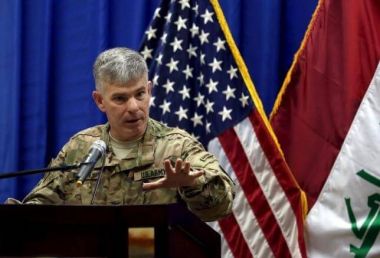U.S.-led coalition kills 3 more ISIS leaders in Iraq airstrikes as Iraqi troops advance on captured city of Ramadi

Three more senior leaders of the Islamic State (ISIS) have been killed in airstrikes carried out by the U.S.-led coalition in Iraq last month, according to the spokesman for the U.S. military command.
Army Colonel Steve Warren announced during a Pentagon briefing the deaths of Abu Salah, the group's finance minister; Abu Maryam, an "enforcer and senior leader of ISIS extortion network,'' and Abu Rahman al-Tunisi, an "executive officer'' who handles the transfer of information, people and weapons. They were all killed in late November during a bombing campaign near the town of Tal Afar, in northern Iraq.
"Killing him (Abu Salah) and his predecessors exhausts the knowledge and talent needed to coordinate funding within the organisation,'' Warren told reporters, according to NBC news.
The U.S. military spokesman also disclosed that the airstrikes killed an estimated 350 ISIS fighters in the city of Ramadi in western Iraq, which was seized by the jihadist group in May.
The news came as Iraqi security forces are reportedly making advances on two fronts in the city of Ramadi, clearing ISIS militants from a key military command base and a neighbourhood on its western edge, NBC news said, citing army officials.
The officials believe that the capture of the sprawling western Ramadi district of al-Taamim and the Anbar Operations Command headquarters on Wednesday "could advance government efforts to retake Ramadi," reports said.
Earlier, Adam Szubin, acting undersecretary for terrorism and financial intelligence, said some of ISIS' funds came from looting between $500 million and $1 billion from bank vaults captured in Iraq and Syria, and through extorting the local population.
He told Chatham House in London that the extremists were selling "a great deal of oil to the Assad regime'' but that the ramped-up bombing campaign on their oil infrastructure over the last month was "markedly degrading their funds,'' the Financial Times reported.
The Pentagon had previously reported the death of an ISIS leader in Libya, and another senior leader of the al-Qaeda group during U.S.-led air campaigns held in November and December.











